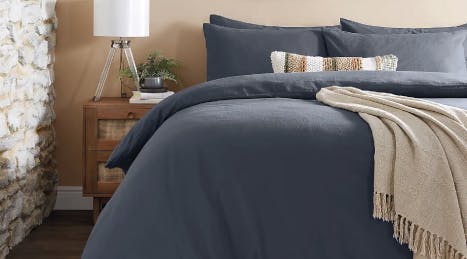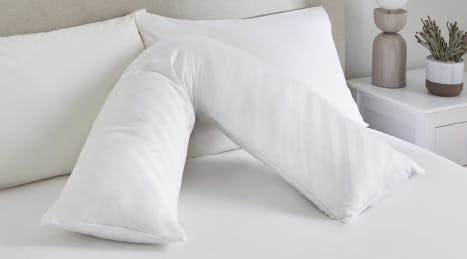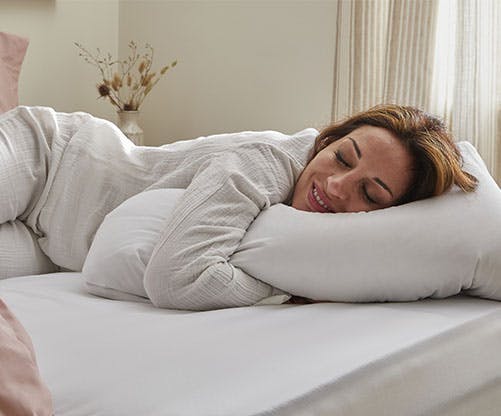Let's talk about menopause...
Right now, approximately 13 million people in the UK are perimenopausal or menopausal.
Menopause comes with a whole host of symptoms, from changes in temperature to shifts in mood, and this Menopause Awareness Month we’re focusing on one of the most frustrating: insomnia. New research from Dunelm reveals that menopausal insomnia has had a negative impact on the emotional wellbeing of 69% of menopausal and perimenopausal women, so we’ve rounded up as many experts as we can to give their very best advice on how to get a good night's sleep during menopause. We've asked everyone from Dame Kelly Holmes to Dr Clare Spencer to share tips, tricks and suggestions for keeping your nights cool, calm and comfortable.
Meet Dame Kelly Holmes....
Kelly, it's so lovely to meet you. Tell us: what's your connection to sleep during menopause?
Menopausal insomnia has been a challenging part of my own perimenopause, both physically and mentally - that’s why I’m supporting Dunelm’s campaign to help people get a better night’s sleep. A good night’s sleep is a fundamental element of good health and being able to function effectively, whether you are at home or at work. The simple tools Dunelm have curated to help people sleep better are easily fitted into everyday life and will hopefully help menopausal people across the UK to sleep better.
Has insomnia in perimenopause affected your day-to-day life?
Waking up at 3am became a regular occurrence for me. Initially I wasn't sure if it was connected to my mum's death or the start of perimenopause, but I now believe they were linked - both things were causing me stress, and waking up at 3am was then adding to the stress I already had because I was so exhausted every day. It can be a vicious cycle!
What tips and tricks have you found useful to improve your wind-down routine?
First, I switched up my sleep pattern and started to go to bed later, just to break the 3am-wake-up cycle. I still only get 5-6 hours of sleep a night, but breaking the cycle helped hugely as it was really adding to my stress. I don’t eat as much before bed but have a warm drink instead. I use scented sleep sprays to create a calming space. Lighting is so important too: I light candles in my bathroom when I have a bath and make sure the lighting is very low if I’m in the kitchen or lounge before I go to bed. Blackout curtains in the bedroom are a must!
This is clearly an important topic for you. Why do you feel so strongly about it?
It's horrible when you're struggling with any life change, but when you also feel out of control because of natural hormonal changes and don't fully understand the myriad symptoms, it can be really distressing. I firmly believe that any education and support is going to benefit everyone.
Advice from Dr Clare Spencer
So, Clare - what is menopause?
Menopause is a transition that occurs as your hormones change and your periods eventually stop. There are three stages to this transition: the perimenopause, menopause and postmenopause.
The perimenopause is the start of this transition, and typically starts when a women is in her mid to late 40s. If you are having periods, they can become irregular and erratic and symptoms of the menopause can start to creep in, often fluctuating in intensity and frequency.
The average age of people experiencing the menopause in the UK is 51 but it commonly occurs between the ages of 45 and 55. However, it’s important to know that around 5% of people go through menopause aged 40-45 (known as an early menopause) while 1% of people going through the menopause under the age of 40 (known as premature ovarian insufficiency - POI).
The menopause is said to have occurred when you have had no period for 12 consecutive months due to your ovaries having stopped making hormones. After this you are postmenopausal. In this third phase of the menopause transition, you may still experience symptoms, commonly for a further five to seven years, though many experience symptoms for longer than this.
Some people enter menopause for reasons other than natural changes in their hormones.
Ok. And what kind of symptoms might people expect?
There are many different types of symptoms that people can experience as they transition through the menopause. Some are well known and others can come as a bit of a surprise.
Symptoms can be:
- physical, such as muscle aches and pains, headaches, palpitations, bladder issues;
- they can be psychological such as anxiety, low mood and depressive symptoms;
- there are cognitive symptoms such as brain fog and memory issues;
- some people are impacted by loss of libido;
- while vasomotor symptoms impact many others - hot flushes and night sweats, or some people feel colder rather than hotter.
Sleep is, of course, an issue also for many - as a result of changes in hormones or as a result of the impact of other symptoms that may keep them awake or disturb sleep.
It's a pretty big change, then. What do we do once we’ve started to notice these symptoms?
We always recommend you speak to your healthcare practitioner or a menopause doctor if you’re experiencing menopausal symptoms or want to talk about your long-term health. They can discuss different options with you, including hormone replacement therapy (HRT), and advise on any lifestyle changes that could help. They should also be able to sign post you to information about the menopause and ways of managing symptoms.
Can you tell us more about how menopause affects sleep?
People experiencing the menopause can experience difficulty in getting to sleep, or may experience night time waking, both of which can significantly impact quality of life and the ability to function the next day.
Broken sleep can be directly connected to some of the physical symptoms of the menopause; you may be woken up by joint pains or hot flushes and night sweats, for example, or you might need to get up in the middle of the night to go to the loo more frequently.
Psychological symptoms, such as anxiety and increased stress, can leave you tossing and turning, too. We know that sleep is affected by low mood and depression also. But sleep can also be affected directly as a result of fluctuating and falling hormone levels. Just the very fact of increasing age also has a part to play as sleep can become more interrupted as we increase with age - for everyone!
There are some medical sleep related conditions that worsen in the menopause - for example sleep disordered breathing refers to a number of sleep related conditions including increased resistance to airflow through the upper airway, snoring, marked reduction in airflow and complete temporary stopping of breathing (sleep apnoea). Restless legs can also worsen in the menopause. Please speak to a healthcare profession if you have concerns about these conditions.
You can get into a vicious cycle when it comes to disturbed sleep. Studies have shown that a lack of sleep can really affect your mood, making your brain focus on negative thinking and even a tendency for your brain to remember unhappy events rather than happy ones. It can impair your judgement and concentration, too, which doesn’t help the experience of menopausal brain fog. These symptoms can impact on mood also, or heighten anxiety which can then, in turn, impact on sleep. Inadequate sleep can also impair your reaction time, so you can become more accident-prone and clumsy.
What can we do to improve our sleep?
There are lots of changes that can help:
- Alcohol may be able to get you off to sleep, but the resulting quality of sleep can be poor. You experience a lighter sleep and don’t feel rested when you wake.
- Caffeine in tea and coffee is a stimulant, of course, and drinking caffeine before bed, or having too much during the day may keep you awake at night.
- Nicotine is also a stimulant, so smoking can cause difficulty with sleeping, too.
- There are studies to show that intense exercise can help manage sleep.
- Avoid large meals that are rich in heavy or spicy foods before you go to bed.
- If you’re a smoker, try your best to quit. Smoking is also a stimulant (as well as being bad for your health more generally).
And once we've done all those, is there anything else we should try?
Yes - there are lifestyle changes that can help too.
Managing stress and worry
It's easier said than done, but try to manage stress and worry so that panicky thoughts don’t keep you awake. This could be with yoga and meditation, exercise or other talking therapies such as cognitive behavioural therapy
Sleep hygiene
Learn about sleep hygiene. This will teach you that getting into a routine before you go to bed can help you get off to sleep - for example avoid screen for around an hour before going to bed, having a bath or warm drink can be soothing, and waiting till you are tired before going to bed can all help.
HRT
Hormone replacement therapy can be helpful, particularly if menopause symptoms are impacting on getting off to sleep or the ability to stay asleep.
As a last resort, there are sleeping tablets that can help as a short term measure only.
Sally runs her interiors and lifestyle Instagram account @GettingStuffDoneInHeels from her family's home in Surrey. We love her humorous and relatable content, and how she's passionate about sharing her menopause journey. We've asked her to pick out her key products for a restful night's sleep:

From soothing breathwork to simple sleep-inducing stretches, we've got a whole host of brilliant ideas from even more experts on our Instagram channel.
DISCOVER MORE
*Dunelm surveyed 2,005 UK menopausal and perimenopausal women.










